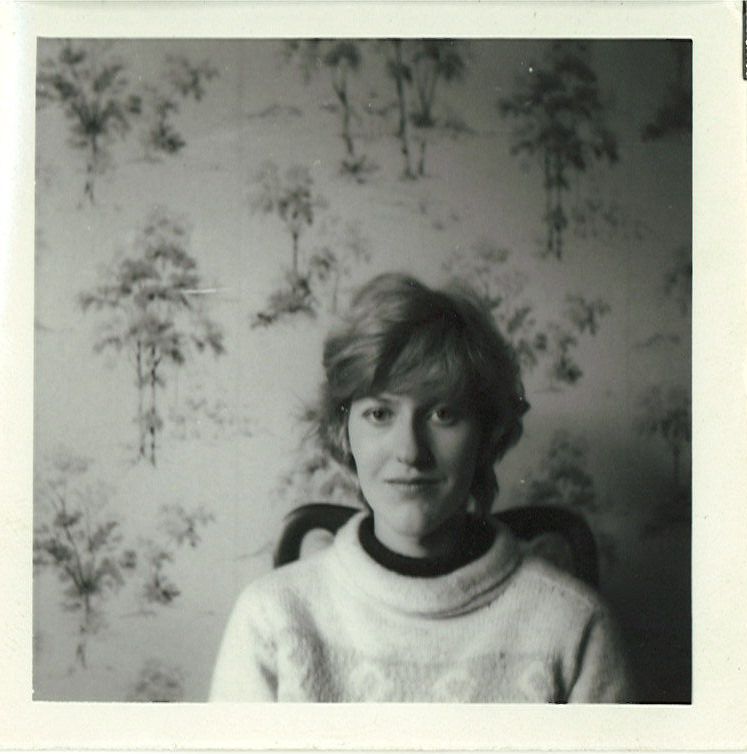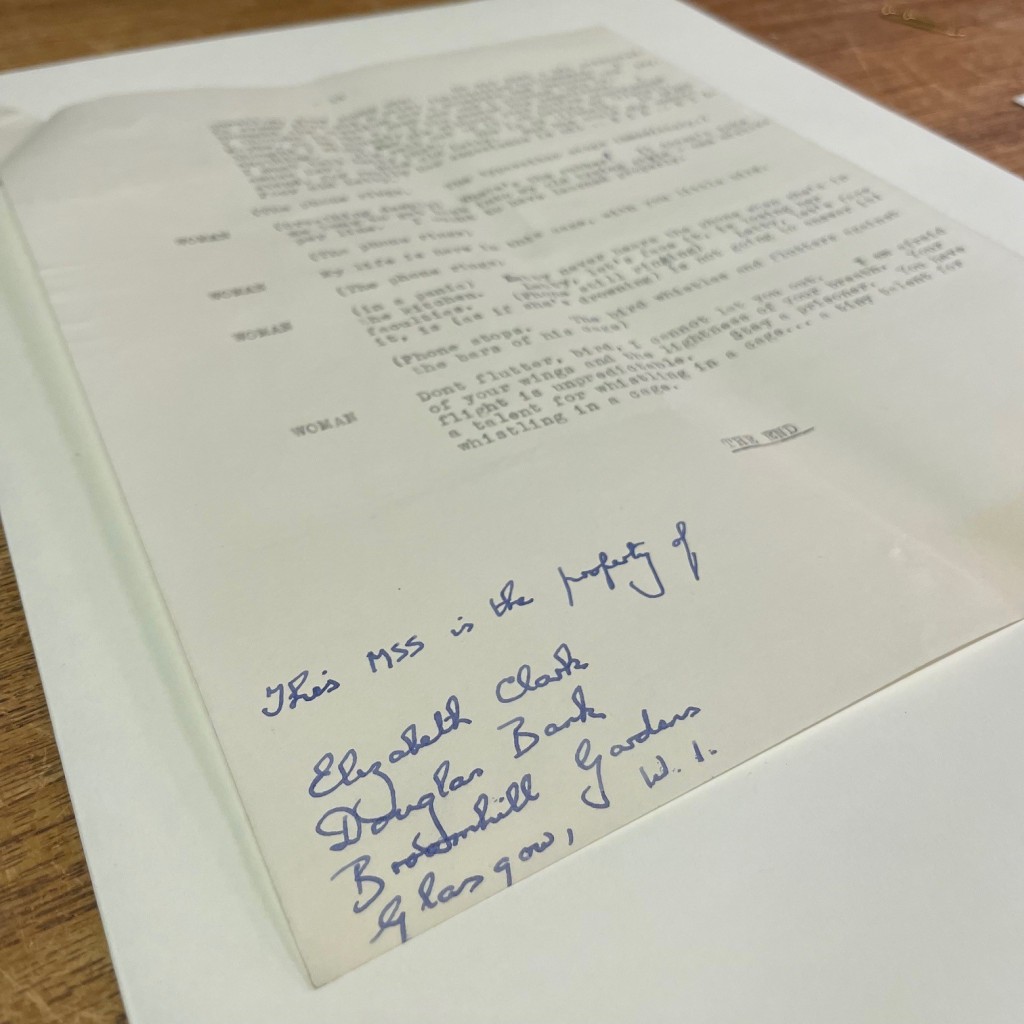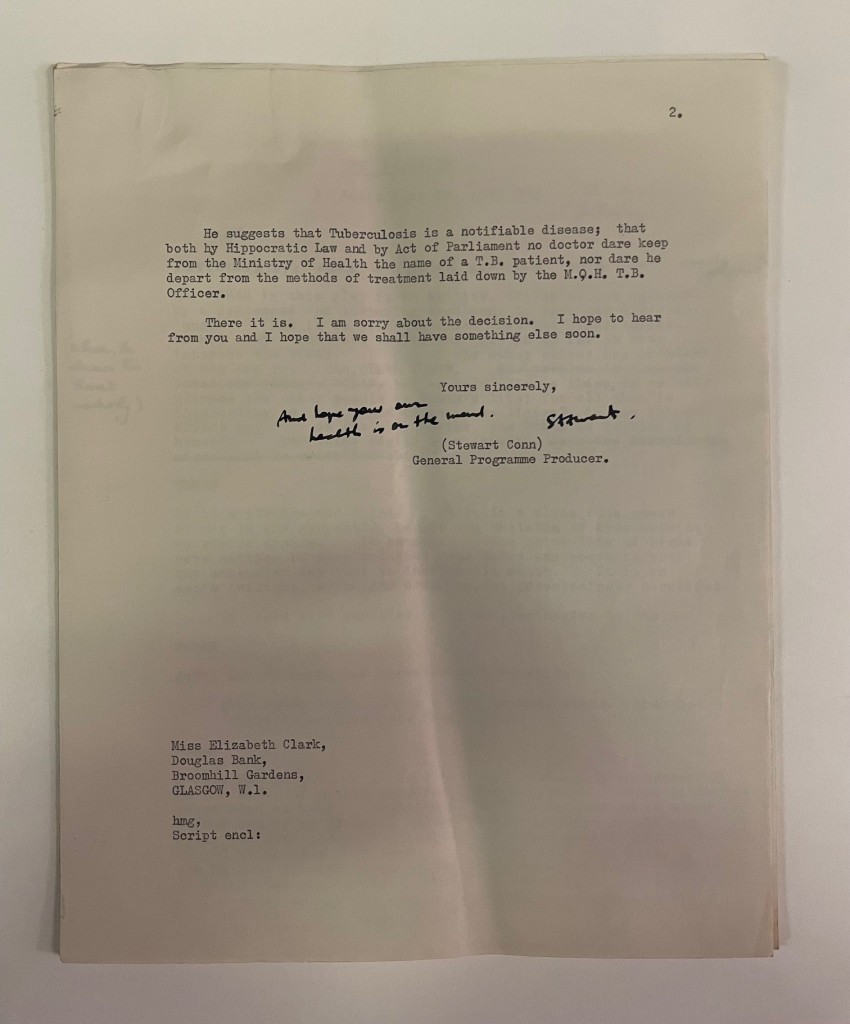A guest blog post by Juliet Steed, from the Memorialising Scottish Literature & Culture placement, working on the Papers of Joan Ure (ASC 011 A: Writings) in Archives and Special Collections
In Ian Brown’s review of The Tiny Talent: Selected Poems of Joan Ure, he characterises the poet as a ‘sophisticated – and often self-effacing – ironist’. As I read and re-read this quotation, with the selection of Ure’s papers I had the privilege of cataloguing in mind, a multiplicity of meanings emerge and expand beyond Brown’s intent. This most peculiarly intimate experience of exposure to Ure (I could, now, recognise her handwriting in a heartbeat) forced me to question precisely why I had never encountered her before under any pseudonym, and why she felt the need to use one at all.
Firstly, and most straightforwardly, Ure was an ironic writer, skilfully selecting the most apt moments to reveal her wry sense of humour. My first introduction to her work was the first annotated playscript in my assigned box of papers: ‘Talk to the Guitar, With Songs for Sheila’. It begins on a metatheatrical note, breaking the tension of a silent stage with the question ‘Which one of us two speaks first- any idea?’. This play never made it to radio, but I like to imagine a knowing chuckle circulating the audience as that line was recited. As Alasdair Gray recalls, Ure was a recognised voice to those in the know, about Scottish Theatre through the 1960s and 70s. Because of the alignment of Ure’s personal and professional trajectory with the literary movement from modernism to post-modernism in the wake of WW2, it is likely the audience were in the know about ironic metatheatre too. It is, therefore, difficult to imagine a lack of appetite for the kind of work Ure was producing, especially considering the lack of female writers available for contemporary female audiences and readers to identify with. Gray wrote that we could breathe a ‘sigh of relief’ in 1980 because Ure’s archive remained accessible to scholars and Scottish drama enthusiasts. In other words, if you knew what you were looking for, you could find it. 44 years later, we are undertaking work to catalogue Ure’s papers in a more accessible format, but she remains conspicuously absent from curricula, playhouses, discussions about women’s writing in Scotland, anthologies, and popular memory. Those who do not know her are denied an introduction. It is not a sigh of relief I breathe but a heavy-hearted sigh of frustration. Ure crossed paths with, and was taken seriously by, influential figures such as Gray and former makar Edwin Morgan, but their platforms failed to amplify the voice of the Tiny Talent.
A partial explanation for this tragic critical neglect lies in the secondary meaning of Brown’s description of Ure: she was a ‘self-effacing ironist’ in the sense that much of her time was taken up with the domestic chore of laundry. After her mother’s tuberculosis diagnosis, she ironed the shirts for her siblings and her father, assuming ‘multiple role of daughter, housewife, and surrogate mother’; when the war broke out, Ure was forced to re-commit herself to the relentlessly uncompensated domestic labour of single parenting. She showed creative promise in her youth, but these endeavours were positively discouraged.
When seven she had written a thirteen-page story and given it to her mother, thinking it beautiful. Mrs Carswell punished her for a misdeed by burning it, and was perhaps surprized by how much she cried
At a young age, then, Ure was encouraged to compartmentalise and conceal the writerly aspect of her identity. Maintaining the household and supporting her family sadly took the lion’s share of her efforts and time in her years of best health. Ure repeatedly claimed that she didn’t write poetry (‘I write pieces for acting’), suggesting a reluctance to put her name on written works up for critical debate. In many of her papers, however, it seems that Ure is the poet and Clark the owner or editor. In ASC 011 A/153/1, a tongue-in-cheek poetry periodical, Elizabeth Clark sings the praises of her prize-winning protegee Joan Ure- the relationship between her two selves is almost maternal here.
Patriarchy, however, is not the sole causes of Ure’s fragmentary identity. She was lastly an ‘ironist’ in the metallic sense, nicknamed ‘The Iron Butterfly’ because of her physical fragility, almost diametrically opposed to her mental fortitude.
Intellectually she was no butterfly and physically she was not iron. Instead of rusting and corroding like the rest of us she drove to breaking point, thank goodness
It was only when I came across a rejection letter from the BBC regarding a radio adaptation of Ure’s play, ‘The Parasite’ that I was struck by the emotional heft of the implications of Ure’s illness. Stewart Conn writes with genuine warmth and compassion that tuberculosis, comorbid with a host of psychiatric ailments including eating disorders has been the deciding factor in the BBC’s decision not to record the play, although opinions on its content were divided. Literary opinions are always divided, and it seems to me that in Scottish Literary Studies at the time Ure was writing, an Achilles heel was a good enough excuse not to let a woman get her foot in the door. Richie McCaffery puts it perfectly frankly: ‘It is high time her name and poetry was brought out of obscurity.’
All this said, with my own personal background of chronic physical and mental illnesses, I cannot help but read Ure’s health problems as a part of her construction of the authorial self, and this complex relationship with identity as something which drove her to create, as much as it was a hinderance. Gray was right to suggest that reading her poems and plays as directly autobiographical would be reductive. They are, indeed, about bigger topics, bigger systemic problems, bigger transcendental feelings, but to dismiss Ure’s use of pseudonym’s is equally myopic. The forename, Joan, was borrowed from her sister after she committed suicide, a common theme through Ure’s work. Anyone unfortunate enough to know the struggle of chronic eating disorders will recognise that in active anorexia, there is a wilful dance with death as well as an assertion of control. In recovery, we are encouraged to separate out and sometimes name the internal voices which push us toward self-destruction and self-criticism; to amplify those which cry out for survival and self-expression. Respiratory illnesses, which Ure also suffered from, represent an uninvited dance with death. The experiential reality of tuberculosis forces a conscious awareness of crackling breath, a constant notification that the patient is alive, for now. This profound irony is beautifully expressed in these lines of Ure’s most famous poem, which I was lucky enough to view in typescript in the University of Glasgow’s Archives & Special Collections, and which I am eternally grateful I managed to avoid greeting on:
Very soon she coughed up the first gobbets of blood. And there she saw, brilliant at last, the brightness of the tiny talent she had.
Brown, Ian. ‘The Tiny Talent: Selected Poems of Joan Ure’ review for The Bottle Imp (2019) via <https://www.thebottleimp.org.uk/2019/07/the-tiny-talent-selected-poems-of-joan-ure/?print=print> [5/3/2024]
Gray, Alasdair. ‘From Woven By Women (Chapman 27/28, 1980) “Joan Ure: 1919-1978”’ via <https://braeeditions.com/2018/12/07/from-woven-by-women-chapman-27-28-1980-joan-ure-1919-1978-by-alasdair-gray/> [5/3/2024]
Maddra, Sam. ‘The Edwin Morgan Papers: Joan Ure – Take Back Your Old Rib, Then’ (2014) via https://universityofglasgowlibrary.wordpress.com/2014/01/20/the-edwin-morgan-papers-joan-ure-take-back-your-old-rib-then/ [5/3/2024]
McCaffery, Richie. ‘The Dangers of Fighting to be Heard in Poetry’ (2016) via https://dangerouswomenproject.org/2016/06/24/joan-ure/ [5/3/2024]
Trotter, Robert. ‘Clark [née Carswell], Elizabeth Thomson [pseud. Joan Ure] (1918–1978), writer.’, Oxford Dictionary of National Biography (2004) via https://www.oxforddnb.com/view/10.1093/ref:odnb/9780198614128.001.0001/odnb-9780198614128-e-60220 [5/3/2024]
Categories: Archives and Special Collections, Library, Reflections



 Joan Ure: MSLC 2024 – ‘When looking to the future, bitterness co-exists with optimism…’
Joan Ure: MSLC 2024 – ‘When looking to the future, bitterness co-exists with optimism…’  Eddie and the Library Angel: Ukrainian Poetry in the Edwin Morgan Archive
Eddie and the Library Angel: Ukrainian Poetry in the Edwin Morgan Archive  Diving into Adam White’s Album Amicorum
Diving into Adam White’s Album Amicorum
Leave a comment